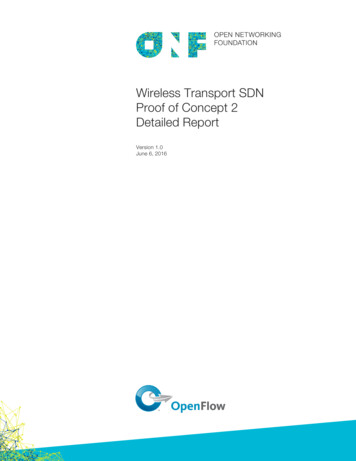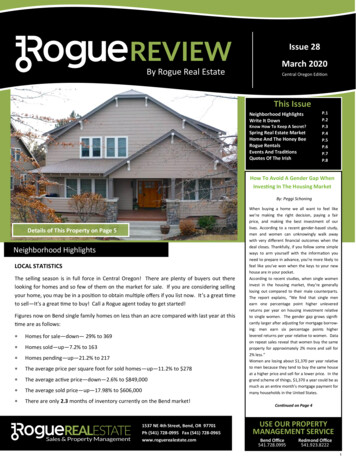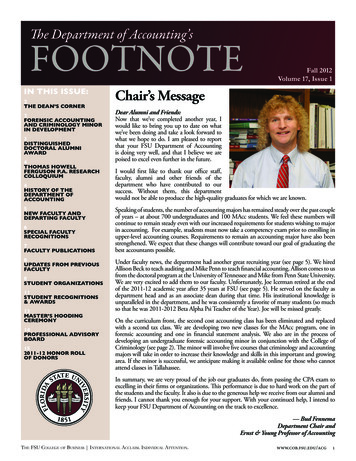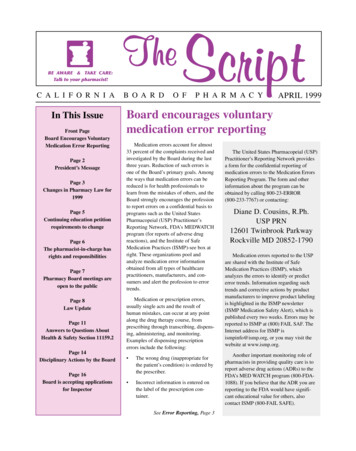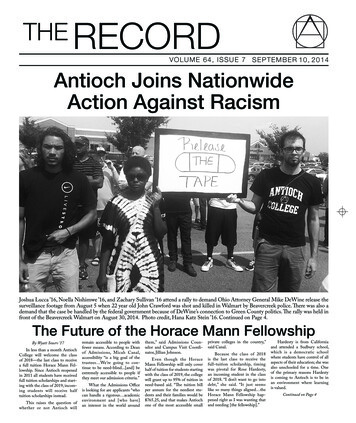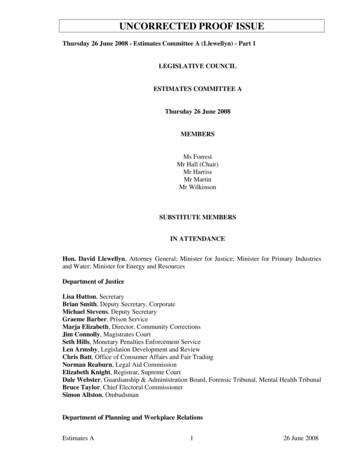
Transcription
UNCORRECTED PROOF ISSUEThursday 26 June 2008 - Estimates Committee A (Llewellyn) - Part 1LEGISLATIVE COUNCILESTIMATES COMMITTEE AThursday 26 June 2008MEMBERSMs ForrestMr Hall (Chair)Mr HarrissMr MartinMr WilkinsonSUBSTITUTE MEMBERSIN ATTENDANCEHon. David Llewellyn, Attorney General; Minister for Justice; Minister for Primary Industriesand Water; Minister for Energy and ResourcesDepartment of JusticeLisa Hutton, SecretaryBrian Smith, Deputy Secretary, CorporateMichael Stevens, Deputy SecretaryGraeme Barber, Prison ServiceMarja Elizabeth, Director, Community CorrectionsJim Connolly, Magistrates CourtSeth Hills, Monetary Penalties Enforcement ServiceLen Armsby, Legislation Development and ReviewChris Batt, Office of Consumer Affairs and Fair TradingNorman Reaburn, Legal Aid CommissionElizabeth Knight, Registrar, Supreme CourtDale Webster, Guardianship & Administration Board, Forensic Tribunal, Mental Health TribunalBruce Taylor, Chief Electoral CommissionerSimon Allston, OmbudsmanDepartment of Planning and Workplace RelationsEstimates A126 June 2008
UNCORRECTED PROOF ISSUELisa Hutton, SecretaryBrian Smith, Deputy Secretary, CorporateMichael Stevens, Deputy SecretaryPeter Fischer, State Planning AdviserRoy Ormerod, Workplace Standards TasmaniaDepartment of Infrastructure, Energy and ResourcesTony Van De Vusse, Director, Energy Planning and ConservationMark Addis, Chief Executive, Office of the SecretaryMandy Russell, General Manager, CorporateTony Beaumont, Manager, Energy SecurityBob Rutherford, Deputy Secretary, Energy and ResourcesTony Brown, Director, Mineral ResourcesMichael Leonard, Director, Mining ProjectsGrahan Sargison, Chief Executive Officer, Private ForestsGraham Wilkinson, Chief Forest Practices OfficerLuke Gregory, Executive OfficerMatthew Fitzgerald, Manager Royalt, Finance and AdministrationAndrew Blakesley, Director, Forest PolicyDepartment of Primary Industries and WaterKim Evans, SecretaryMichele Moseley, Deputy SecretaryJohn Whittington, Deputy SecretaryRobert Cockerell, General Manager (Corporate Services)Stephen Godfrey, General Manager (Information & Land Services)Wes Ford, General Manager (Primary Industries)Penny Wells, A/g General Manager (Resource Management and Conservation)Martin Read, A/.g General Manager (Water Resources)Alan Harradine, A/g General Manager (Water Resources)Kate Kent, General Manager (Strategic Policy)Alex Schaap, General Manager (Biosecurity and Product Integrity)John Diggle, Director (Inland Fisheries Service)Ministerial StaffGraham Wilson, Head of OfficeMichelle Lowe, AdviserDr Kathryn Campbell, Senior AdviserSimon Boughey, Senior AdviserNick Wright, Senior AdviserPeter Pearce, Senior AdviserScott Bacon, AdviserEstimates A226 June 2008
UNCORRECTED PROOF ISSUECHAIR (Mr Hall) - Thank you everybody and welcome to Minister Llewellyn and his stafftoday. The order of the running sheet is Department of Justice division 7 first, then Energy andResources division 6 and finally DPIWE Division 11.DIVISION 7(Department of Justice)Mr LLEWELLYN - In relation to the Attorney-General and Justice portfolio, I can advisethat this year will be mainly one of consolidation for the portfolio. Demand remains strong formost of the services provided by the Justice department and our associated bodies. This demandis being managed with additional resources provided in both last year's Budget and this year's.There are, however, a number of initiatives in this year's Budget that the committee needs to drawits attention to, and I am sure they have looked at it. The Tasmanian Prison Service budget hasbeen under pressure from increasing operating costs since the opening of the prison in 2006. Thisyear's Budget has an additional 1.6 million recurrent funding for the Prison Service to coverincreasing costs of salaries and wages, services, food, clothing, energy, power, water and so on.The Budget also delivers on safety with a one-off allocation of 800 000 to undertake work tosecure the perimeter fence at the Risdon Prison complex. Also, committee members should notethat the department's forward Estimate includes funding to commence phase D of the prisoninfrastructure redevelopment program. That is a program that will continue through 2009-10 withthe bulk of the construction costs associated with an additional maximum security block falling in20011-12. It is out a bit but that was part of the original program. This allocation is significantbecause it demonstrates the Government's commitment to continue to upgrade the infrastructure atthe prison.The Budget also includes further capital allocation of 874 000 this year to upgrade theholding cells at the Hobart Supreme Court. Work is needed to maintain a safe workingenvironment for Corrections and court staff, and having regard to the State's duty of care to peoplein detention. I would also like to note in passing the launch of the Monetary PenaltiesEnforcement Service, which I know was of interest to members in the Legislative Council. Weare going along pretty well with outstanding penalties owed by corporations, money that waspreviously uncollectable. I think we are making quite significant inroads in collecting thatmoney. Quite a number of corporations have come forward with fairly large sums of money thathave been derived from fines and so on for vehicles that have been attributed to the companyrather than to individuals.Another long-running project coming to fruition is the new legal professions regulationregime. The Legal Profession Act, which implements the national model in Tasmania, will comeinto force in the next few months. In the meantime, there has been a lot of work taking place inthe new regulations and legal profession rules, with very valuable assistance coming from theLaw Society and other stakeholders.Appointments have been made to the new Legal Professions Board and the DisciplinaryTribunal membership is close to finality.Mr WILKINSON - How many complaints did you receive last year?Mr ALLSTON - On the latest figures, 943 in all jurisdictions.Mr WILKINSON - Is that up on the previous year?Estimates A326 June 2008
UNCORRECTED PROOF ISSUEMr ALLSTON - It is about the same as last year on the figures that I have. I should qualifythat. We have both complaints and inquiries: a complaint is a matter where we open a file and weactually do some substantive work on it; an inquiry is something which does not get that status. Aperson might ring in and say that it is out of jurisdiction or they need to be referred back to theagency to make their complaint there or some other reason. We have had an increase in inquiriesover the last year by a substantial amount.Mr WILKINSON - What is the increase in inquiries over the last year?Mr ALLSTON - In the previous year it was in the order of 700 and this year it has been inthe order of 1200. That is largely attributable to the fact that I am taking calls direct from theinmates in the prison and from detainees at Ashley who can ring in direct if they have a concern.On the complaint level we seem to be holding the same sort of levels as the previous year.Mr WILKINSON - In relation to these extra inquiries that you have they have to be lookedat in some depth to see whether they become a complaint or not, correct?Mr ALLSTON - Yes, that is right.Mr WILKINSON - And the average time for that would be what?Mr ALLSTON - Probably 10 to 15 minutes.Mr WILKINSON - So you have an extra 500 of those from last year. As you say an extra10 to 15 minutes to see whether they can become a complaint. Are your staffing levels able tocope with that or are they under some stress in meeting all their obligations?Mr ALLSTON - At the moment we are able to cope. A concern I have is whether or not Ican resource major investigations if they come along. At the moment I have to take staff off-linefrom complaint management in order to carry out a major investigation.Mr WILKINSON - In relation to major investigations how many of those have you gotgoing?Mr ALLSTON - We had one we started recently which as it evolved did not become as largeas I expected. That is ongoing and will be completed in the next couple of months. I have threematters which I am looking at that I think deserve considerable resources.Mr WILKINSON - In relation to those you would need some investigative staff, have yougot those with your division?Mr ALLSTON - I have if I take them off-line from complaint management work. It is veryhard to find really competent investigation staff and you tend to grow them through yourorganisation rather than find them elsewhere.Mr WILKINSON -It would seem to me that the only two areas where investigative staff canbe gained are firstly the police and secondly through the Ombudsman's office as a result ofexperience that they have had in that office.Estimates A426 June 2008
UNCORRECTED PROOF ISSUEMr ALLSTON - That is right, and police are not always well suited to the sort of work anombudsman does.Mr WILKINSON - Why is that?Mr ALLSTON - Because they have a different focus, they have a focus particularly oninvestigation of crime, perhaps they are less sensitive than they need to be when you are dealingwith government agencies.Mr WILKINSON - How many investigative people have you?Mr ALLSTON - I have 10.Mr WILKINSON - And you are saying if the investigations that you believe might becomeworthwhile to proceed with, three in the melting pot at the moment, are those nine or 10 peopleable to cope with those?Mr ALLSTON - I trust so.Mr WILKINSON - But by doing that they would have to take their eye off the ball as far asthe complaints are concerned?Mr ALLSTON - That is right. It causes backup. It means that the complaint managementwork has to be moved around the office to other staff.Mr WILKINSON - So it would seem to me as an outsider without any actual knowledge ofexactly what goes on in the Ombudsman's office, that you would be classed as being understaffedif that were the case and you continued with your three investigations?Mr ALLSTON - Yes. It is a tentative situation.Mr WILKINSON - If that is the case do you then have to decide whether to proceed withthe investigations as a result of the staff that you have compared to whether the investigation isworthwhile or not?Mr ALLSTON - I have not been placed in that situation but it could arise.Mr LLEWELLYN - Can I make a comment about it?Mr WILKINSON - I do not care who answers the questions.Laughter.Mr LLEWELLYN - I am conscious that the Ombudsman is independent. But I just want tomake the comment that I have met with the Ombudsman on a couple of occasions now. I havenot been in the Attorney-General's job all that long and we didMr LLEWELLYN - I have not been in the Attorney-General's job all that long and we diddiscuss the issue of some restructuring within the office that would enable a freer arrangement etcetera. It was very late in the budgetary period. I recall it was in May or April -Estimates A526 June 2008
UNCORRECTED PROOF ISSUE[9.45 a.m.]Mr ALLSTON - It was in April.Mr LLEWELLYN - Yes. So I have just said to the Ombudsman, I am happy to pursue theissues of resourcing with him if there are any issues that he has and he thinks he cannot handlethrough the year, and the difficulties associated with it, to come and talk to me about it; not onlyfrom the point of view of providing extra resources in money terms but there could be someoptions of providing additional staff that might assist the Ombudsman displace other people thatcan actually do other work and so on. So I would be very happy to receive any submissions fromhim on that sort of basis. In the meantime for next year's Budget we might be able to have a fullerlook at the issue.Mr WILKINSON - All right. In relation to the extra staff that you may need, then, does thatrequire any change in your officers to properly equip those people to do the job that they would berequired to do?Mr ALLSTON - Perhaps to follow up on what the Attorney was saying: what I put forwardin April was the possibility of having a deputy ombudsman. That would help with theadministration of the office, which, as you would know, operates across a diverse range ofjurisdictions. My intention was that it would enable me to have an additional investigation officerand to have a separate investigation string which would deal just with these more significantinvestigations. So I probably would end up recruiting an additional investigator.Mr WILKINSON - Often the Ombudsman's office is either the last or the second-last port ofcall, have gone through solicitors, gone through the courts, gone through solicitors again after thecourts have been Mr LLEWELLYN - Members of parliament.Mr WILKINSON - That is what I was saying; first or second last port of call, because oftenit is either the parliamentarian or alternatively the Ombudsman's office where the complaintsfinish. Therefore, because of that they are fairly difficult clients to handle from time to time. Itwould therefore seem to me that there is a need for a certain type of person with the expertise todeal with those people. Is there any special training that your staff go through in order to dealwith these, if I can call them, difficult clients?Mr ALLSTON - You are quite right that a very large proportion of the people who come tous are not easy to deal with and they have been taxed by what they have experienced up to thatpoint. There is a national program which has been run over the last year or 18 months which isfunded by the Commonwealth Government and is run out of the New South Wales Ombudsman'soffice, which is called Dealing with Unreasonable Complainants. This has involved workshopsaround the country and the development of training materials and we have been part of thatproject. We had two workshops in Tasmania in the last year on that very subject. We do not haverolling training on that issue; people learn from their peers I suppose. It is a small office; it is only17.5 FTEs. There is a lot of interaction and a lo
Hon. David Llewellyn, Attorney General; Minister for Justice; Minister for Primary Industries and Water; Minister for Energy and Resources Department of Justice Lisa Hutton, Secretary Brian Smith, Deputy Secretary, Corporate Michael Stevens, Deputy Secretary Graeme Barber, Prison Service Marja Elizabeth, Director, Community Corrections Jim Connolly, Magistrates Court Seth Hills, Monetary .




